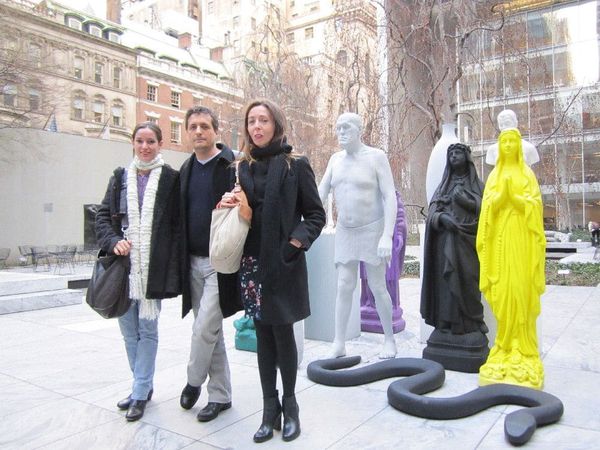 |
| Aquarius producer Emilie Lesclaux and director Kleber Mendonça Filho with Anne-Katrin Titze in the Museum of Modern Art sculpture garden for Neighboring Sounds Photo: Jytte Jensen |
Kleber Mendonça Filho's volatile ode to the private and the public, stars Sônia Braga with Thaia Perez, Maeve Jinkings, Humberto Carrão, Irandhir Santos, Zoraide Coleto, Paula De Renor, Fernando Teixeira, Buda Lira, and Barbara Colen.
Before the US premiere at the New York Film Festival, the director/writer and I spoke about Brazilian society, outside/inside, Reese Witherspoon as Tracy Flick in Alexander Payne's Election, shooting wide, sense of place, Maren Ade's Toni Erdmann associations and John Lennon and Yoko Ono's Double Fantasy, the ever present madeleines, creating the perfect tactile version of a childhood memory, and Diego as the international evil in Aquarius.
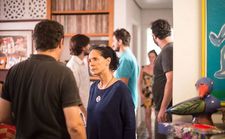 |
| Sônia Braga as Clara: "That's where she lives, that's where she has lived and that's what she is trying to keep." |
Objects contain links to a past that would otherwise be forgotten. Aquarius, on one level, deals with how we remember in a world going through drastic changes. Digital messages in a bottle are a different beast from a tactile unearthing. Social dynamics, a city in flux, a world growing old and another emerging - the film's neighbouring thoughts cast a broad net of questions.
An apartment building by the sea in Recife and Clara (Sônia Braga), a woman living in the building, reveal history trapped in both. Divided into three parts, Aquarius begins with a get-together in 1980. As we move into the present, Clara, a music critic, is the last remaining inhabitant. Developers want to get rid of her after they bought out all the others by using a variety of measures in an attempt to make her leave the "ghost building".
Aquarius, which had its world premiere at the Cannes Film Festival, is a widescreen experience that captures things essential to living. Deliberately casual cruelties served with a snake-charmer smile are intended to wear down rightful resistance.
Meeting Kleber again in New York brought back memories for the two of us of longtime New Directors/New Films selection committee member and Museum of Modern Art Department of Film Curator Jytte Jensen, who died in 2015. It was Jytte who introduced us when he was presenting Neighboring Sounds in 2012 at ND/NF. Her enthusiasm and positive outlook for the films she curated was always in play. She had a distinguished career that included a wide range of programming for over 30 years at MoMA.
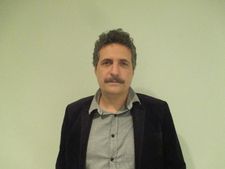 |
| Kleber Mendonça Filho: "For me it's always very important to shoot in a very clear way as to establish where the character is." Photo: Anne-Katrin Titze |
Anne-Katrin Titze: It must be strange being in New York without Jytte here.
Kleber Mendonça Filho: Yeah, but I actually felt it stronger the last time I came here last year. Also Cannes without her is very strange because we would always meet and at least have one dinner.
AKT: At MoMA, I still see her coming around the corner. It still hasn't completely sunk in.
KMF: The director of the Rio International Film Festival, Ilda Santiago, we met briefly on the street in Cannes and we started talking about Jytte, just like you said, she said that she almost saw her in the corners of Cannes. And then we look and there is a woman coming and she was very much like Jytte. A very strange moment.
AKT: I remember when she introduced us at MoMA and we were talking about cinemas. Cinemas that were turned into something else. I mentioned a supermarket I went to and you insisted that there would be a spot where it showed itself, where I could see that it used to be a cinema.
KMF: Archeology.
AKT: And I did.
KMF: You did? What was it?
AKT: When you come in. An ornament you could see that was clearly above the marquee.
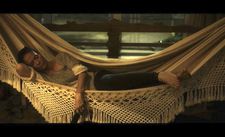 |
| Clara: "There is the right side which is where the records are. And on the left side there is a hammock and the big window." |
KMF: That's what it was? I'm glad you found it.
AKT: You were so 100% convinced that it would show its former existence.
KMF: Because they always get lazy at one point. Let's leave it, we're running out of budget, you know. And it's always there somewhere, the remains of what it was.
AKT: Which is very fitting with your film [Aquarius] and where we are sitting [in the Elinor Bunin Munroe Film Center green room]. This used to be a parking garage. Don't you feel some of that in this building?
KMF: Yeah, yeah, it makes sense.
AKT: Aquarius is very much about the building. The two are almost competing. There is Clara's story and the building's story. Is that your fascination?
KMF: Yes, but it comes from actually a very practical preoccupation, which is to place her in a very clear and streamlined way in a physical environment. Which is very important for the film, of course. That's where she lives, that's where she has lived and that's what she is trying to keep. For me it's always very important to shoot in a very clear way as to establish where the character is.
Which is probably very obvious to say that. But I actually see a lot of films where I don't really see very well where the action is taking place. It's out of focus or you can't see anything behind the ears.
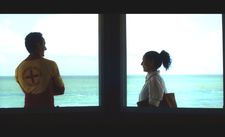 |
| Roberval (Irandhir Santos) with Clara: "That inside/outside is very important to me." |
So shooting wide, very wide - not only because it's widescreen - but in wide angles and establishing where she is. This is the living room, but this is the left side of the living room. There is the right side which is where the records are. And on the left side there is a hammock and the big window. And to the right there is a corridor and at the end of the corridor her bedroom.
It's almost like I could challenge someone who saw the film, after the film, maybe on a napkin in a bar or restaurant. The person should be able to draw Clara's place. But that's her apartment.
The building itself had to be interesting - because it is interesting - but to shoot it in a way that you understand what is at stake in the whole little drama that she has to live through. Shooting wide, giving information and making it crystal clear where the story takes place. And also establishing very well outside and inside.
AKT: I see.
KMF: I mean, this is important in any culture, of course. But in Brazilian society, private space is very well guarded, almost like an obsession. Perimeter areas and perimeter fences. This is the outside, this is public and this is the inside and this is mine! Nobody comes in! So that was very important for me.
AKT: In the outside, you have that scene on the beach where the people have their heads on each other's bellies doing breathing exercises.
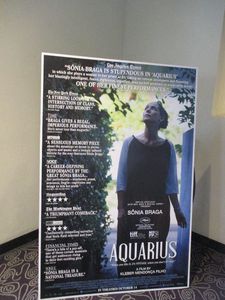 |
| Aquarius poster at the Angelika Film Center Photo: Anne-Katrin Titze |
KMF: Yes. That's outside, that's clear, that's public. When I was talking to you just now, I was actually thinking even inside the window and outside the window. There's a tracking shot which starts outside with the men arriving and then it goes inside. Also when she is at home alone at night and there is people having sex on the beach and then people playing football and then the camera pulls back and she is in the hammock.
That inside/outside is very important to me. The people doing the breathing exercises is clearly outside and it's public. It's a democratic attempt at offering exercise, physical exercise for people. The problem is because that's an expensive, upper-class neighborhood it generates its own selection process. And then when the three kids arrive and they are black and poor from the other community, it generates some tension.
Completely unwarranted. It's only based on … And this has been much discussed in Brazil now when the film was released. People writing about that sequence, because the writers themselves thought that something violent would happen. Because in their minds it would happen. But they just come in and enjoy what's being offered in fact. That is also a revelation of another outside/inside because it's a bubble. And then the kids come and burst the bubble.
AKT: That's why I brought it up in the context of outside/inside. I did not expect anything violent to erupt at all at that moment.
KMF: Because you come from a different culture, maybe.
Coming up - Kleber Mendonça Filho on Reese Witherspoon as Tracy Flick in Alexander Payne's Election, John Lennon and Yoko Ono's Double Fantasy, Maren Ade's Toni Erdmann links, the madeleines, creating the perfect tactile version of a childhood memory, and Diego as the international evil in Aquarius.
Aquarius New York Film Festival screenings: Sunday, October 9 at 8:30pm - Alice Tully Hall; Tuesday, October 11 at 6:30pm - Francesca Beale Theater - Expected to attend: Kleber Mendonça Filho and Sônia Braga
Aquarius will screen at the BFI London Film Festival on October 14 at 6:00pm; October 16 at 8:15pm.
Aquarius opens in the US on October 14.
The 54th New York Film Festival runs through October 16.





















